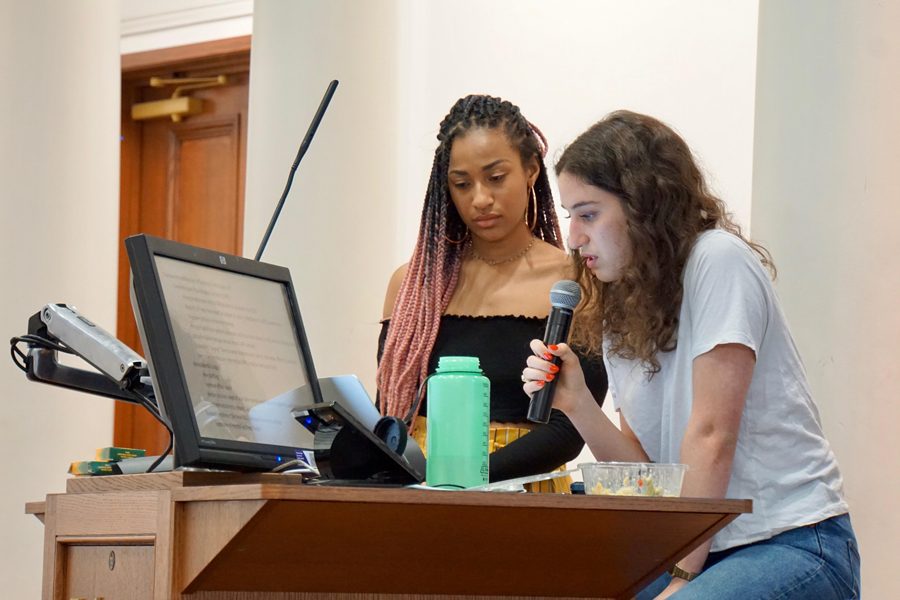‘Fund Our Care’ hosts town hall on mental health resources, students share stories
Owen Stidman/Daily Senior Staffer
Students at the town hall. Northwestern students spoke out about mental health resources
April 26, 2019
Medill sophomore Cayla Clements said even though the University “appears” to give help to students, seeking mental health resources is actually a process students must do on their own.
“Things as little as, ‘You have to be the one to call CAPS,’” Clements said, “that CAPS won’t call you when you have to schedule an intake, that just the school won’t be there for you.You have to go through every part of the process yourself and that shouldn’t be how the school is run.”
Clements spoke Thursday at a town hall in Harris Hall organized by Fund Our Care Collective where students shared their stories about struggling to find adequate resources at Northwestern.
The Fund Our Care Collective was created this fall when students wanted to call for more action from the University after sophomore Daniel Jessell died by suicide. The group has a list of 10 demands for the administration — including decreasing the Counseling and Psychological Services ratio to 800 students per counselor by 2022 and making a majority of the requested new hires be people of color and members of the LGBTQ community. They also want to guarantee CAPS availability during Wildcat Welcome.
Those who attended shared stories of sexual assault, feeling suicidal and ways Northwestern has failed to provide adequate resources, especially for marginalized students. Some said CAPS failed to follow up with either them or their friends, while others said the process of getting help was already difficult enough to do by oneself and was not conducive to healing.
Weinberg senior Jessica Ogwumike, a member of the collective, said the group understood the budget deficit may cause a challenge for funding, but she added that the University should “get creative.”
“We’re fighting for priorities that better align with the preservation of student life, essentially,” Ogwumike said.
In December, the collective marched to the Rebecca Crown Center to deliver their demands to Patricia Telles-Irvin, the vice president for student affairs. Two days before the protest, Telles-Irvin announced the hiring of two new CAPS staff members and the formation of a task force focused on student well-being.
Weinberg junior Romie Drori said there has not been follow-up information about the new hires or the task force, despite requests from students. She added that when students and the members of the collective have asked for public town halls, the administration has responded with offering one-on-one “closed-door” meetings.
“The whole thing is shrouded in secrecy,” Drori said. “They said there’s no administrative resources for notes.”
Two administrators — SESP Dean David Figlio and Liz Trubey, Weinberg assistant dean for academic advising — attended the town hall. Members of the collective said they personally invited 15 administrators, including Telles-Irvin, Dean of Students Todd Adams, Provost Jonathan Holloway and the director of CAPS, though they did not make an appearance.
Figlio said he has seen how students are “in pain” and as an administrator, it is helpful for him when students can name the pain they are experiencing.
“My heart melts because I know how hard you work,” Figlio said. “People work really hard at this institution.”
Incoming Associated Student Government vice president Adam Davies, who attended the town hall, said going forward ASG can help facilitate talks with students and administrators. The SESP junior said ASG could possibly host a town hall or have administrators speak at public ASG Senate meetings.
“As a trans student, personally this is something I’ve seen time and time again,” they said. “One of the things we’re really trying to do is bring resources to marginalized students who need them the most.”
Email: [email protected]
Twitter: @sn_handler


